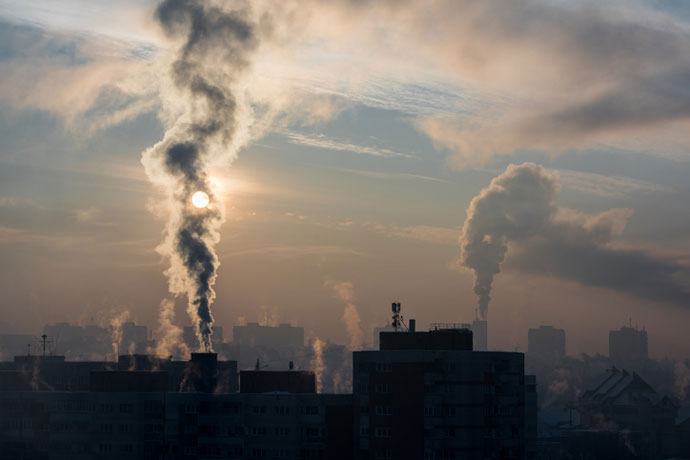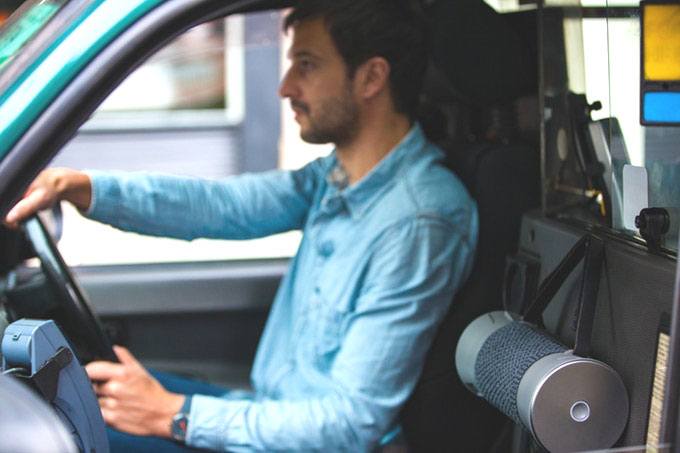
The air we breathe is literally killing us. It’s estimated that 92 per cent of the world’s population is exposed to unsafe levels of air pollution. In Britain alone, over 40,000 people die prematurely every year as a result of our poisoned air.
Given an adult takes in around 20,000 litres of air every day, it’s startling most of us care so little about its quality. Perhaps it’s because even the most polluted air can appear clean that we overlook the global scale of the threat; six times more people die as a result of air pollution than malaria and four times more than HIV/AIDS.
Air pollutants in cities are usually made up of nitrogen dioxide, particulate matter, carbon monoxide from home appliances and ozone from ultra-violet radiation and chemical reactions with other airborne pollutants. Crucially, if you live in an urban environment, it’s almost impossible to escape the air pollution. Exposure to nitrogen dioxide inside a car can reach levels ten times the legal limit – the equivalent of smoking two cigarettes over the course of one hour.
The reluctance of government to legislate against air pollution, and of drivers to use their cars less, has spawned the Airbubbl – an air filter that scrubs clean the air inside a car. Most modern cars filter particulates from the air taken into the cabin, but the £295 Airbubbl also removes 95 per cent of nitrogen dioxide. Although it has yet to launch officially, it has already secured enough pre-orders to reach it’s £50,000 crowdfunding target.

Living in an Airbubbl: The irony of an after-market air filter may be lost on many diesel car drivers
A joint inquiry by four committees of MPs earlier this year described Britain’s air pollution as a “national health emergency”, which is hardly surprising given the government’s inability to tackle it; the government’s clean air plans have been judged illegal three times in the high court. And the latest proposal, rejected by the high court earlier this year, was condemned as ‘inexcusable’ by doctors.
After all, when doctors aren’t busy saving lives, they’re being told to save money; If people swapped driving for walking or cycling for a quarter of trips, the NHS and wider society would save over £1bn every year in health costs from local air pollution, according to new research by the universities of Oxford and Bath.
Air pollution from cars and vans costs Britain almost £6bn every year in health bills with the impact most acute in cities. The health cost of an average car in inner London over its lifetime was calculated by the researchers to be almost £8,000. For diesel cars this figure was nearly double. The damage to health from diesel vehicle emissions is around five times higher than petrol vehicles and 20 times greater than for EVs (electric vehicles).
Founder of Clean Air London, Simon Birkett, describes the fight against poisonous air as “the trenches”. “If you cannot tackle this problem, which is much more tangible for people, you can forget about other problems,” he says, pointing out in a Financial Times piece this week that climate change is much more complex.
| One solution to air pollution that’s rarely discussed – because it’s as toxic for politicians as the poisons we currently breathe – is road road user charging.
Most people want a strategic road network that is safe, reliable, high quality and with traffic that flows freely. Road user charging would gather the funds to provide well-engineered highways to access every town in Britain.
Tolls that vary in price to take into account the congestion at a particular time of day as well as the emissions and weight of a vehicle would be a more sophisticated and equitable alternative to the vehicle excise duty and fuel tax we have now.
The government should be upfront about what our national road network would look like; say how much it would cost to build; and, show how the charges would be collected. There would be many objections – from individuals and organisations but there are convincing arguments to rebut all of them.
At the moment the government cannot provide any logical reason why a road is a motorway, dual carriageway, an “A” road or a “B” road. Our government needs to declare that all our major cities, like Leeds, and ports, like Hull, will be connected by motorways; that all our cities will be connected by dual-carriageways and all our towns by expressways. All our roads must all be reclassified to make driving easier.
The cost of bringing all the roads up to scratch will be high but affordable. The technology for collecting the road charge has been around for years and is cheap to introduce. Most people would prefer the new approach once they got used to it – think about it: no car tax, no fuel duty but instead a charge for the road you use as you use it. What could be fairer and more transparent than that?
Ethical insurance
Not only are we ethical, we campaign for sustainable transport. Sometimes that means protesting until a school gets the zebra crossing they’ve been refused or running 60 roadshows this year to encourage people out of their cars, or fixing bicycles for free. We also launched Green Transport Week and helped establish Car Free Day and Twenty’s Plenty to name just a few. We’ve been campaigning for sustainable transport in this way for over 27 years with the help of people like you. Supporting this work is easy – you simply have to take out insurance with us. Home insurance, cycle insurance, travel insurance and breakdown cover and we take care of the rest. We provide an excellent level of cover while putting concern for the environment at the heart of all we do.


Euan Thomson
Isn’t the photo at the head of the article “Living in an Airbubbl” misleading? Flue (and vehicle exhaust) gases contain varying pollutants which cause the health problems discussed in your article. But the “white” smoke shown in the photo is produced when water vapour in the combustion gases coming out of chimneys condenses where it meets the surrounding cold air on a cold winters day. It’s the same when we breathe out into cold air. Although we don’t see so many of them these days – a good sign – remember the “smoke” (“steam”) coming from cooling towers next to coal-fired power stations in winter? And the tall chimneys next to them often produced huge plumes of condensed water vapour rising high into the air.
edmund white
Makes you wonder what it will take to get through to the Gov, we all know why they will not act, there scared of the oil/car company’s. cars in towns must go, no other way.
Tony Williams
There are at least three major topics in this article – air pollution, road pricing, and a large-scale programme of road-building and improvements – but I don’t think the way the article links them together is convincing. I’ll take road pricing first.
It would be interesting to investigate this, because I’ve no doubt that people would think more carefully about using road vehicles if there was a clear and identifiable cost for every journey. It’s a bit like the big reduction in the use of plastic bags once you had to pay a small charge for each one. I’m sure statistics exist for the total number of vehicles of each category and the number of miles they cover each year. It would be relatively easy to work out how much per mile would need to be charged to raise the same amount as we currently pay in road tax and fuel duties. Apportioning different rates to each type of vehicle, from heavy lorries to mopeds, would be more controversial, but a range of possibilities could be worked out. Some users would find the proposals alarming while others might welcome them.
Assuming that road pricing would reduce the total amount of vehicle use, there would be a reduction in pollution, but that is likely to happen anyway, with a growing proportion of pure electric or hybrid electric vehicles, and maybe other types of fuel being used as well. I don’t see road pricing as the main way of reducing pollution from vehicle exhausts. It might contribute to some reduction in the pressure on the road system.
It’s uncertain whether road pricing could produce sufficient revenue to pay for the major transformation of the road system that the article suggests. We ought to ask whether such additional revenue should be used to develop or improve other forms of transport such as railways, on which many people depend to get to work in larger urban areas. Big road improvement schemes might lead to a transfer of both passengers and freight from railways to roads.
It isn’t true that “the government cannot provide any logical reason why a road is a motorway, dual carriageway, an “A” road or a “B” road”. In a great many cases it’s obvious. I don’t know what an “expressway” is or what makes it suitable for routes between towns, and it isn’t at all clear why “All our roads must all be reclassified” and how that would “make driving easier”. It’s in this area that I think the article becomes confused and weakens the case for tackling pollution and how road pricing might help to do that.
Peter Kinnear
I agree completely with Tony Williams; we don’t need a ‘complete new road system’— that will just perpetuate the problems we have already. More comprehensive public transport, and CLEAN public transport– electrified railways, trams, electric buses (remember trolleybuses?) together with encouragement to ‘use the mode that suits the journey’. There will always be some journeys for which a car will be most suitable. The object should be to reduce car use (not necessarily car ownership) by encouraging people to use the mode most suitable for the journey.
The Government are not scared of the oil companies half as much as they are scared of US, the man (and woman) in the street with a VOTE! Look at the fuss and opposition every time there is a proposal for a tram system or a freight depot;
the opposition to HS2 (which will free-up train paths for freight on the existing railway routes).
The problem is how to change public opinion. Don’t expect the likes of the Daily Mail or the Daily Express to campaign for better transport and less car use!